1st Year
MONTH
9
1st Year – Month 9
Plan a Special Time for You and Your Baby

It’s so easy to get caught up in daily routines that you may overlook the need for a special time for you and your baby. Think about setting aside a time each day when you can give your baby your undivided attention with no interruptions.
The length of time is up to you. Even a small pocket of time, maybe 10-15 minutes a day, can mean a lot for both of you.
How can you spend this special time? Sing, read, play, or listen to music. Relax together. Cuddle. Enjoy being together.
Babies are happier and learn how to amuse themselves if parents give them moments of their time and attention.
It takes less than a minute to give your baby a hug and a kiss or to play pat-a-cake.
What’s It Like to Be 9 Months Old?
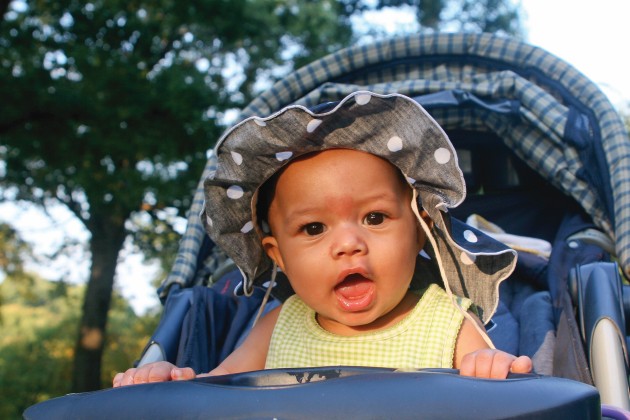
How I Grow and Talk
- I may crawl and turn around while holding something in one hand.
- I crawl up steps, but I may not be able to crawl back down yet.
- I may sit by myself and turn my body all the way around without losing balance.
- I may be able to stand for a little while if you hold my hand and I sidestep along furniture.
- I don’t really need shoes to help me learn how to walk. When I start walking, shoes will protect my feet.
- I try to build towers with blocks or toys.
- I poke my fingers into holes or into anything that looks interesting, including electrical outlets.
- I pick up small things with my first finger and thumb, and larger things with both hands.
- I like to bang things together.
- I feed myself finger foods. I’m pretty messy!
- I play with a spoon and a cup, but I’m not good at using them yet.
- I understand some words, my name, and simple sentences.
- I repeat one or more sounds over and over.
- I like to cough, click my tongue, and make hissing noises.
- I listen to people talking and try to copy the sounds.I say two-syllable sounds such as “choo-choo,” “da-da,” and “ma-ma.”
How I Respond
- I like to watch people scribbling on paper.
- I like to show people what I can do and love it when they clap their hands for me.
- I sometimes want praise when I do something well.
How I Understand and Feel
- I’m very sensitive. If I see another baby crying, I will cry, too.
- I am afraid of a lot of things that didn’t bother me before, such as taking a bath. I may be afraid of heights.
- I am very determined—that’s all part of my growing up. I may “test” you by trying to throw food when you feed me or by crying when you put me to bed.
- I try to figure things out by myself.
- I know that if I partly cover my eyes or look upside down, everything will look different.
- I know which toys are mine and get upset when they are taken away.
- I can remember a game, person, or toy from the day before.
Some children do things earlier or later than described here. Most differences are normal. Focus on what your child can do and get excited about each new skill. If you notice that your child is lagging behind in one or more areas for several months, use this list to talk with your doctor about your child’s development.
Act – Don’t Just React
To learn, babies and children need to be able to explore their surroundings and to experiment. Listen to yourself. If you find yourself saying no all the time because you are afraid they will break something or hurt themself, think about changing the way things are arranged in your home. For example, move that fancy clock to a higher shelf. Put safety latches on the kitchen and bathroom cupboards. Move the houseplants to a spot where your baby can’t go. Figure out a way to cover up the buttons on your radio or television. This will make life easier for you, and you won’t have to stop your baby from exploring so often. It’s easier and better to change your home than to discourage your child’s curiosity. Sometimes you will have to say no to your baby. If you save it for the times when you need to protect them from getting hurt, it will be a much more powerful word.
Picky! Picky!
Sometimes a baby will not like a certain food one day and will eat it a few days later. Every once in a while, try giving your child a food they didn’t like. You may find that this is the day they like it. Make foods into finger foods. Nine-month-olds like to feed themselves. They like to feel grown up. Cut your baby’s food into very small pieces. Avoid foods that could cause your baby to choke. Avoid small hard foods like popcorn, nuts, seeds, or raw vegetables. Avoid round and slippery foods, such as whole grapes or hot dog circles. Mealtime should be a pleasant time for you as well as for your baby. They will eat more on some days than on others. Don’t force your baby to eat. They will eat if they are hungry.
When Will My Baby Walk?
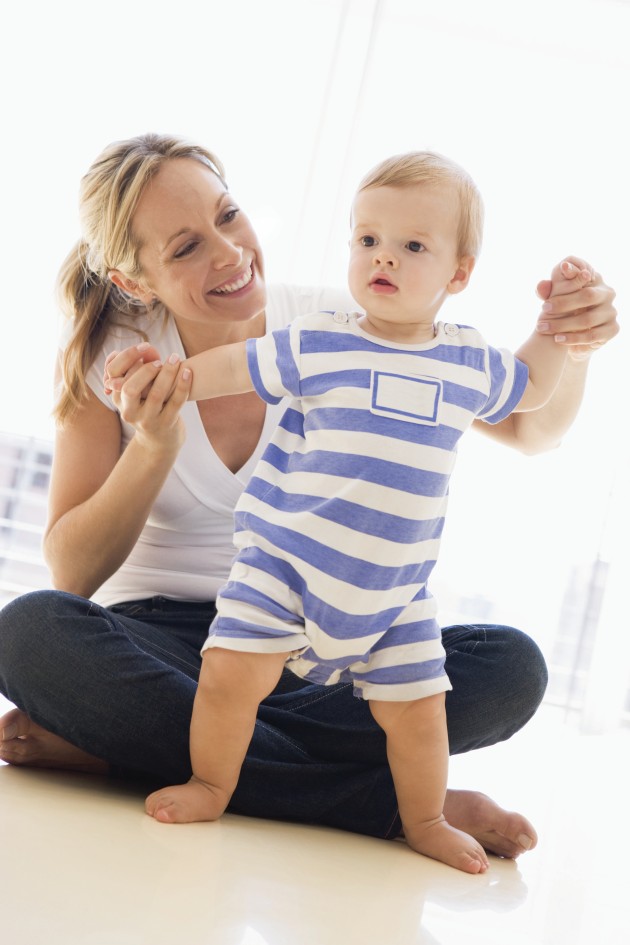
When babies walk depends on:
- Their weight
- Whether they are aggressive, timid, or passive
- Their general rate of development or the speed at which the bones, muscles, and ligaments are growing
Most children go through the same stages but at different paces. Your baby may be a little ahead or a little behind other 9 month old babies.
There’s really not much you can do to hurry or slow down your child’s growth. However, it’s a good idea to help your baby use and exercise their large muscles. Help them kick, splash in the bath, wiggle their toes, stretch, and roll over. Give them lots of freedom to move about. Put a toy just out of their reach, and see if they scoot, stretch, roll, or crawl to get it.
Helping Curiosity Grow
Researchers have learned that curiosity is very important for success in school. Curiosity for your baby is an interest in exploring and finding out what is happening all around them. A child who is interested in what is going on around them watches to see what happens and learns from it.
You can’t really teach curiosity with flash cards or similar teaching methods. Young children learn best when they are in charge of their own learning, not when you try to force something on them.
Your child’s first year is a very important time in laying a foundation for a lifetime of curiosity.
You can help your child develop curiosity about their world. People who study children say that encouraging a child to explore is very important. This helps the child develop the curiosity skills needed to answer questions they face as they get older.
Here are some ideas that you can begin working on right away:
Hearing Let your child listen to soft music. Help them make sounds by banging blocks together. Talk and sing to your baby.
Sight Use brightly colored clothes, toys, and room decorations. Show your baby the pictures that hang on your walls and the pictures in books and magazines.
Touch Give your child many textures – soft, hard, smooth, and rough. Touch your child and let them touch your skin, hair, and clothing. Tell your baby what they are touching as they touch it. Say things like, “Feel how soft the kitten is?” or “The ball is hard.”
Taste Encourage your child to try new and different foods.
Smell Give your baby many chances to smell safe things, such as soap, food, flowers, and feet.
The child who is curious is a child who is learning.
Try to see and hear things as your baby does. Share the experience. When your baby gets excited about something, they probably have had a “wonderful idea” about it. That is what learning is all about!
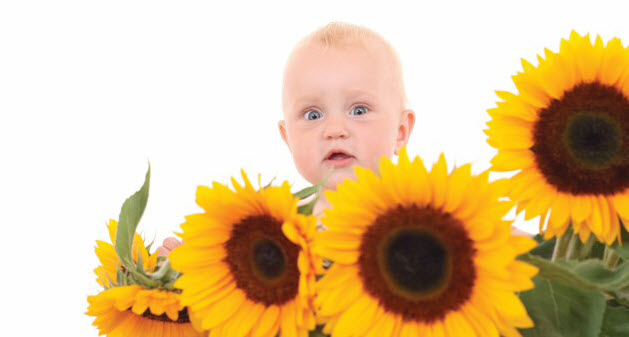
Learning to Talk
Talking and explaining helps your baby to understand. While you might feel silly talking to your baby, research shows that when you imitate and respond to your baby’s sounds, it helps them learn language.
What is that noise? Have you heard some strange shrieks coming from your baby? They are trying different sounds to see which ones get the attention they want. Keep listening. You may hear certain tones of voice and sentence patterns in your child’s babbling.
Your baby may be getting ready to say their first word soon! Your baby may make a sound such as “ba” that they use for many different things. These sounds indicate that talking isn’t far away. When your baby is between 9 and 12 months of age, don’t be surprised to find a real word or two mixed in with the babbling.
Use hand motions and actions to help your baby understand what you mean; point to different objects. Say the word as you point. Point to show which direction you want them to go.
Watch Your Baby’s Cues for Hunger and Fullness

Does your baby give you the “raspberries”? That is, do they sputter with their tongue and lips? This is sometimes a clue that they have eaten enough food for now. Watch carefully for signals of “I’ve had enough.” When your baby is still hungry, they may cry if you stop feeding them. Your baby will probably follow the food with their eyes when they are hungry.
Feeding Your Baby
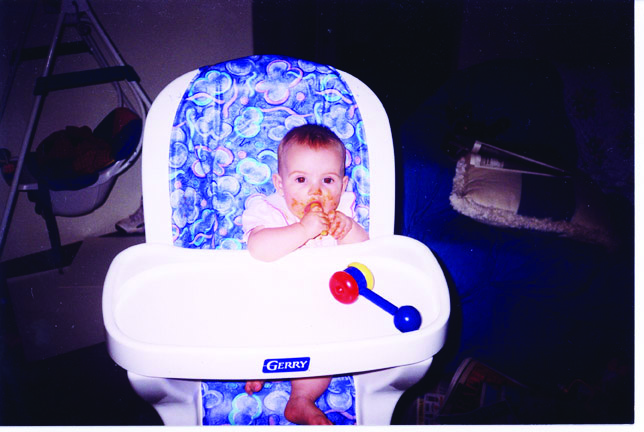
Does your baby hold most foods while eating? Do they drink from a cup with a little help? Do they hold and lick the spoon after it is dipped into food?
These are the first steps in learning how to eat by themself. You can help your baby practice by giving them some of the following finger foods:
- Dry, unsweetened, round and puffed cereals
- Small pieces of soft, mild cheese
- Cooked (never raw) vegetable strips or pieces (carrots, peas, green or waxed beans, zucchini, or sweet potatoes)
- Peeled, soft fruit wedges or small pieces (bananas, peaches, pears, plums, avocados, or melons).
- Be sure they will “mush” easily in your baby’s mouth.
- Cottage cheese, shredded cheese, and small pieces of soft tofu
You should not put seasonings in your baby’s food. Although you may find your baby’s foods bland or tasteless, they like it that way.
Your baby can now eat most of the things you cook for the rest of the family. Just take out their food before you add salt or other seasonings for the rest of the family.
Praise your baby while they are feeding themself, even if they are very messy. If the mess really bothers you, spread some newspapers or a plastic tablecloth under your baby’s chair to catch food that they drop.
The Secret to Good Behavior: REWARD IT!

At this age, discipline is simple. It means loving care and guidance. The key is reward. Many parents pay attention to their children’s behavior only when it upsets them. This teaches a child that attention only comes when they do something bad.
Reward your baby with your loving attention when they play well. Don’t become a parent who only notices their child when they have done something wrong. Notice the good times, and give your baby a smile, a laugh, or a hug. Your attention is your baby’s best reward. Use it to encourage good, not bad, behavior.
Prevent situations in which your baby might do something you don’t like. Move the TV control to a higher shelf. Put a gate across the stairs. If your baby does something you don’t like, think of ways you could keep it from happening again. Create a trouble-free environment.
Ignore behavior that is annoying but not harmful. If your baby pulls everything out of your sock drawer, take a deep breath and ignore it. If you pay too much attention, it teaches your baby to do things such as this to get attention from you.
Save “No!” for times when your baby’s safety is in danger.
Distract or redirect your baby from things you don’t want them to have or do. If they have your keys and you need them, don’t grab them out of their hands. Instead, hand you baby an interesting toy and they will let go of the keys then. It’s easier to get a baby started on something else than to take something away from them.
Provide freedom within limits. Your baby needs freedom to explore, but they also need limits. You need good judgment to provide both. For example, your baby should not be in the bathroom when you’re not with them; shut the door to the bathroom. Babies kept in playpens or high chairs for much of the day don’t have enough freedom. They miss opportunities to learn. They don’t get a chance to move and exercise. Your baby needs freedom on the floor to safely explore.
Your baby may cry about the limits you have set. You may be tempted to give in to their demands. Keep in mind that setting limits is necessary for your child’s safety. Say, “I know you are angry, but you are safe. I would rather have you cry because you are angry than because you are hurt.”
You can set limits while giving your baby freedom to explore and to grow. Make the area where your baby plays as safe as possible. Stick to the limits and be firm in your guidance. Offer your baby safe activities, like playing with plastic bowls and cups.
Roughhousing with Your Baby
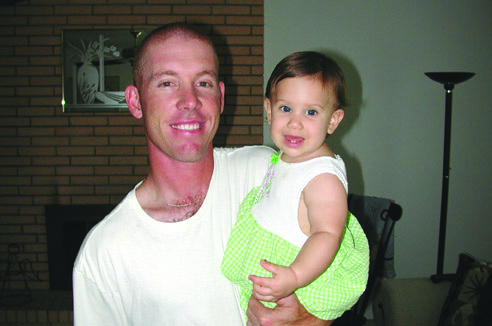
Some parents like to swing babies around, lift them high in the air, bounce them high and low, and tickle and chase them. Babies enjoy this. But keep it safe!
Never shake a baby! This can lead to blindness, brain damage, or death. Never jerk a baby’s arm. The joints could easily be dislocated. Hold them under the arms by their chest instead. Don’t throw your baby in the air. Instead, lift them over your head without letting go.
Some fun and safe ways to play with your baby include:
- Chasing them as they crawl
- Rolling them along the floor
- Holding them so they fly like an airplane
- Dancing with them
Reminders
Subscribe: If you are not already a subscriber, you can receive the newsletters direct to your email on your child’s birthday. Register at JITP.info (English) or (Spanish).
Every baby is unique: When reading this newsletter, remember: Every baby is different. Babies may do things earlier or later than described here.
Updates: We are constantly reviewing and updating JITP.info. See our current plans on the About Us page. Do you have questions or corrections? Email us at contact@jitp.info.
Credits: This newsletter was reviewed and updated in 2020 by YaeBin Kim and Dan Weigel (University of Nevada-Reno) and Anne Clarkson (Wisconsin-Madison Extension).